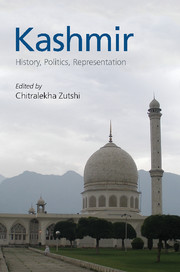Book contents
- Frontmatter
- Dedication
- Contents
- Acknowledgements
- Map 1 Pre-Partition Jammu and Kashmir
- Map 2 Contemporary Kashmir
- Introduction: New Directions in the Study of Kashmir
- PART I HISTORY
- PART II POLITICS
- PART III REPRESENTATION
- 11 Embedded Mystics: Writing Lal Ded and Nund Rishi into the Kashmiri Landscape
- 12 Producing Paradise: Kashmir's Shawl Economy, the Quest for Authenticity and the Politics of Representation in Europe, c. 1770–1870
- 13 The Kashmiri as Muslim in Bollywood's ‘New Kashmir films’
- 14 The Witness of Poetry: Political Feeling in Kashmiri Poems
- Contributors
- Index
12 - Producing Paradise: Kashmir's Shawl Economy, the Quest for Authenticity and the Politics of Representation in Europe, c. 1770–1870
from PART III - REPRESENTATION
Published online by Cambridge University Press: 03 August 2019
- Frontmatter
- Dedication
- Contents
- Acknowledgements
- Map 1 Pre-Partition Jammu and Kashmir
- Map 2 Contemporary Kashmir
- Introduction: New Directions in the Study of Kashmir
- PART I HISTORY
- PART II POLITICS
- PART III REPRESENTATION
- 11 Embedded Mystics: Writing Lal Ded and Nund Rishi into the Kashmiri Landscape
- 12 Producing Paradise: Kashmir's Shawl Economy, the Quest for Authenticity and the Politics of Representation in Europe, c. 1770–1870
- 13 The Kashmiri as Muslim in Bollywood's ‘New Kashmir films’
- 14 The Witness of Poetry: Political Feeling in Kashmiri Poems
- Contributors
- Index
Summary
Introduction
From the late eighteenth to the late nineteenth century, the shawl was Kashmir's principal export commodity and its most celebrated material representation to the outside world. Acknowledged by Walter Benjamin as the ‘essential hot commodity’ of the first half of the nineteenth century and known simply as a ‘Cashmere’, the shawl was the object of insatiable desire in Europe; so widespread was this desire that Benjamin characterized it as the ‘disease’ of ‘Cashmere Fever’ (Benjamin, cited in Hiner, 2005, 76). In the late nineteenth century, demand for and production of shawls declined precipitously. Today, over a century later, despite its diminished economic significance, the shawl remains Kashmir's most iconic commodity – a metonym for the Valley, embodying a quintessentially Kashmiri quality. The Kashmir shawl, I argue, acquired much of this symbolic density in its entanglement with the status politics of European elites and their quest for authenticity in the nineteenth century. This entanglement has had an abiding impact on representations of Kashmir, its people and their material productions.
As Pierre Bourdieu notes, consumption is instrumental in the assertion and reproduction of social hierarchy, and distinctive patterns of consumption serve to distinguish various social classes (2014). In mass societies that are characterized by anonymity, ‘conspicuous consumption’ becomes the key to communicating as well as constituting status (Veblen, 1927). Nineteenth-century Britain was witness to an unprecedented rise in levels of consumption among even the ‘lower’ classes, a development historians have described as a consumer revolution (McKendrick, Brewer and Plumb, 1985). This had important consequences for the meaning of objects – as access to commodities was democratized, they became common and therefore less potent as markers of status.
In such situations, the maintenance of social distinction calls for novel modes of consumption, or altogether new objects (Bourdieu, 2014, 227). In the pursuit of novelty, elites in industrial societies seek out objects that are extraneous to their own space and time, which therefore appear to be culturally remote (Baudrillard, 2008, 77–79; Graburn, 1976, 19). Such ‘marginal objects’, like antiques or exotic commodities, fall outside the system of modern objects and are valued not for any strictly functional imperatives, but for their symbolic value (Baudrillard, 2008, 77–79).
- Type
- Chapter
- Information
- KashmirHistory, Politics, Representation, pp. 265 - 283Publisher: Cambridge University PressPrint publication year: 2017



